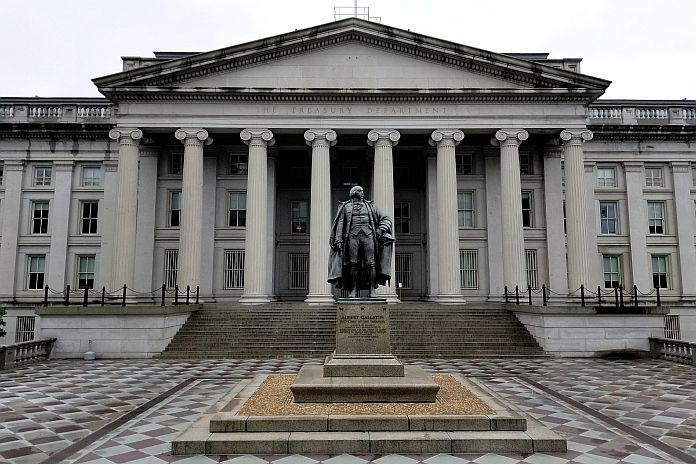– Excerpts from Secretary of the Treasury Janet L. Yellen’s remarks at press conference ahead of the 2024 Spring Meetings of the International Monetary Fund and World Bank
WASHINGTON, USA – On Tuesday, April 16, Secretary of the Treasury Janet L. Yellen held a press conference at the Treasury Department and delivered remarks on her key priorities for the Spring Meetings.
The following are excerpts from the secretary’s remarks as prepared for delivery:
“Let me now turn to the global economic outlook, which remains resilient. Global growth has consistently exceeded the predictions of many forecasters and the IMF projects it will continue at 3.2 percent this year and 3.1 percent next year.
“Global economic performance has in part been powered by a strong US economy. While even one year ago, many forecasted much weaker US economic performance, US GDP growth is strong and expectations have been revised upward since January. The labor market is also remarkably healthy. Inflation has come down significantly since its peak, though we have more work to do. We’re also focused on building on our historically fast and inclusive recovery by investing for the medium- and long-term, including through president Biden’s Investing in America agenda.
“We of course recognize that the recovery has been uneven across and within many countries and that there remain risks to the global outlook. And from the start of the administration, president Biden has made clear that American isolationism was over. So while we expect that America’s economic strength will continue to underpin global growth, we’ve also been engaging with the world to mitigate short-term risks and support sustainable long-term growth. We’ll continue doing so this week.
Bilateral engagements
“As Treasury Secretary, I’ve focused on deepening economic ties with both our longstanding allies and partners and emerging markets. President Biden and I believe that promoting peace and prosperity abroad leads to stronger markets that can benefit American workers and firms through trade and investment. And deepening ties helps us build resilient supply chains – an approach I’ve called friendshoring – which bolsters our nation’s economic security and brings benefits to other economies.”
[…]
International financial architecture
“Alongside bilateral engagements, we’re focused this week on continuing our efforts to strengthen the international financial architecture. Heightened vulnerabilities from challenges including climate change, pandemics, and fragility and conflict pose risks to global growth and development. No one country can tackle these issues alone, nor is bilateral action sufficient, so we’ve pushed for decisive and coordinated action.”
[…]
Ongoing conflicts
“Finally, we’re focused this week on advancing our work to protect human lives and the global economy in the context of ongoing conflicts.
“As Russia’s invasion of Ukraine continues in its third year, we remain committed to standing as part of a global coalition to support Ukraine and constrict Russia’s ability to wage its brutal war. This is a humanitarian and moral imperative and also an economic one given the war’s significant negative impacts on economies around the world. I’m glad that the IMF recently affirmed Ukraine’s strong performance on its program and is providing financing and expertise to support economic growth and a robust reform agenda. And I urge the US House of Representatives to provide critical support for our allies, including Ukraine. We announced additional sanctions on Russia’s National Payment Card System and on Russian regional financial institutions in February. And we are continuing to work with our international partners to unlock the economic value of immobilized Russian sovereign assets and ensure that Russia pays for the damage it has caused.
“We’re also responding to challenges in the Middle East. The attack by Iran and its proxies underscores the importance of Treasury’s work to use our economic tools to counter Iran’s malign activity. We’ve targeted over 500 individuals and entities connected to terrorism and terrorist financing by the Iranian regime and its proxies since the start of the administration, including targeting Iran’s drone and missile programs and its financing of Hamas, the Houthis, Hizballah, and Iraqi militia groups. From this weekend’s attack to the Houthi attacks in the Red Sea, Iran’s actions threaten the region’s stability and could cause economic spillovers.
“As we continue to use economic tools, including against Hamas, we have emphasized Treasury’s humanitarian-related authorizations to ensure sanctions do not impede life-saving aid. In Gaza, the entire population – over two million people – faces acute food insecurity and most of the population has been displaced. It is incumbent on all of us here at these meetings to do everything in our power to end this suffering.
“Finally, to support stability in the West Bank and Gaza, Israel, and the broader Middle East region, we are targeting perpetrators of extremist settler violence in the West Bank, working to ensure a functioning banking system there, and supporting the IMF programs in Jordan and Egypt.”





